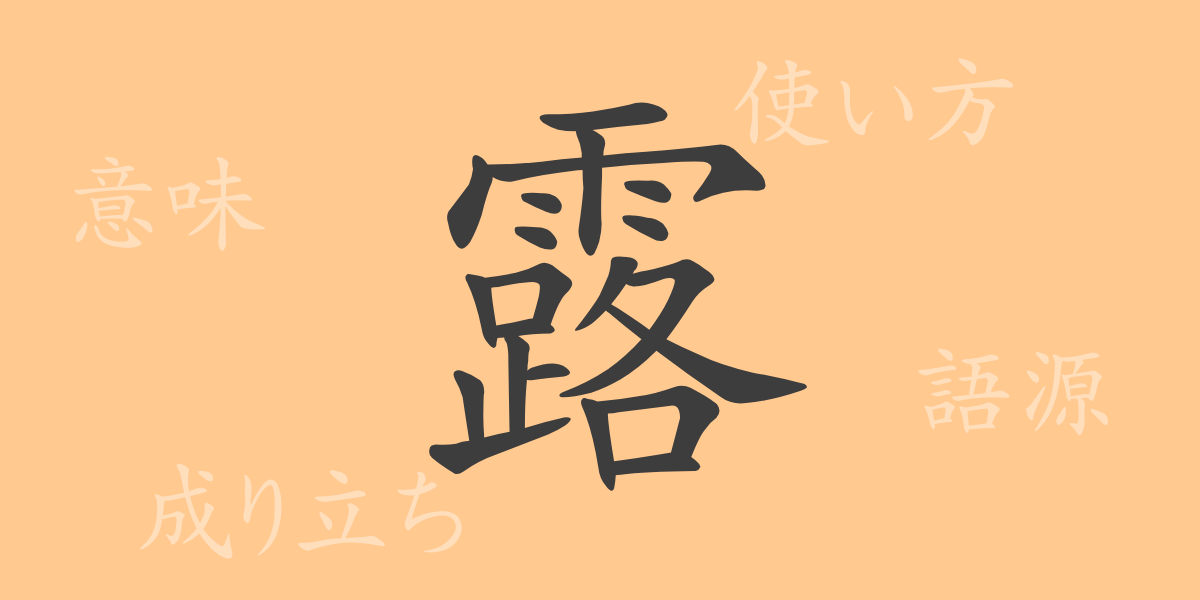The morning dew drops that rest on the early flowers. They symbolize the beauty and transience of nature and have been frequently celebrated in Japanese poetry and literature. However, did you know that the kanji “露(つゆ, tsuyu)” holds deeper meanings and origins, and is deeply rooted in our daily lives through idioms and proverbs? In this article, we will explore the world of the common kanji “露(つゆ, tsuyu)” and unravel its charm.
The Origin of “露(つゆ, tsuyu)”
The kanji “露(つゆ, tsuyu)” has been used since ancient times in China to describe natural phenomena. Its origin comes from the word “露出(ろしゅつ, roshutsu),” which means small water droplets formed by the condensation of water vapor on the surface of the ground or plants cooled at night. In classical Chinese literature, dew often served as a poetic image, helping to depict picturesque scenes.
Meaning and Usage of “露(つゆ, tsuyu)”
The kanji “露(つゆ, tsuyu)” is used not only to represent the natural phenomenon of dew but also in a wide range of figurative meanings. For example, in the form “露骨(ろこつ, rokotsu),” it means “blatant or undisguised,” and in the word “露見(ろけん, roken),” it is used to mean “the revelation of a secret or something hidden.” Additionally, in the form “露わ(つゆわ, tsuyuwa),” it means “to become visible or apparent.”
Reading, Stroke Count, and Radical of “露(つゆ, tsuyu)”
The kanji “露(つゆ, tsuyu)” has various readings.
- Reading: In On’yomi (Chinese reading), it is read as “ロ(ro),” and in Kun’yomi (Japanese reading), it is read as “つゆ(tsuyu).”
- Stroke Count: The kanji “露(つゆ, tsuyu)” has a total of 21 strokes.
- Radical: The radical of this kanji is “雨(あめ, ame),” characterized by the “rain crown” shape positioned at the top.
Idioms, Proverbs, and Phrases Using “露(つゆ, tsuyu)”
There are various idioms, proverbs, and phrases in Japanese that include “露(つゆ, tsuyu).” Here are some examples:
- 露骨(ろこつ, rokotsu): A word that describes a blatant or undisguised manner.
- 露見(ろけん, roken): The act of a secret being revealed, or the state of being exposed.
- 露払い(つゆはらい, tsuyuharai): Literally means to sweep away the morning dew, but metaphorically refers to paving the way as a pioneer.
- 露知らず(つゆしらず, tsuyushirazu): Refers to being ignorant of worldly matters, or to describe such a person.
- 一露一寒(いちろいっかん, ichiroikkan): A proverb describing the rapid changes in the world, derived from the alternating dew and cold of autumn nights.
Summary of “露(つゆ, tsuyu)”
The kanji “露(つゆ, tsuyu)” not only represents a small natural phenomenon but also symbolizes various emotions and societal events in our lives. Widely used in Japanese culture and language, “露(つゆ, tsuyu)” demonstrates its presence while seamlessly integrating into our daily lives. We hope that through this exploration, you have come to appreciate the rich meanings and charm of this single character.

























